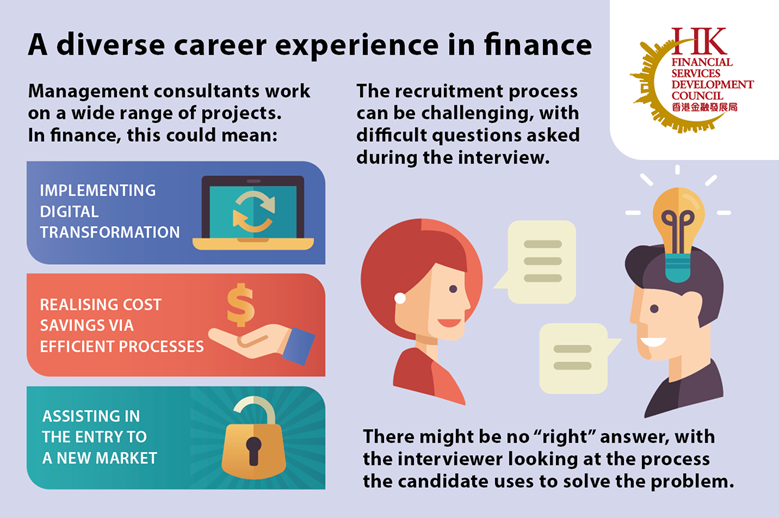Management consultancy – a career for analytical and curious minds
Management consultants are problem solvers. Senior leaders in many industries rely on the expertise of consultants to take their business to the next level. A smaller project might address a single issue in one part of the business, while larger projects can shape a business’ entire corporate strategy.
In the financial services industry, this could include helping a bank realise a digital transformation, assisting an asset manager to enter a new market, or enabling an insurer to realise cost savings via more efficient processes.
How can young professionals get a start in management consultancy? This was the topic of the latest instalment in the Financial Services Development Council’s (FSDC) Practitioner Speakers Series, where two senior management consultants shared practical advice on how to get into the industry.
A knowledge industry
Management consultants work for companies in all industries, in every geography. Consultancy firms are able to do this due to the extensive knowledge they have accumulated from past projects. But at the same time, each new project is unique, requiring consultants to quickly acquire the information needed to make a real contribution.
“We need to be able to go into the companies that we work with and speak to them in a smart way so that we can add value,” said Arthur Shek, Managing Partner of Hong Kong Office, McKinsey & Company.
One thing that makes management consultancy stand out compared to other career paths is the possibility for new consultants to make a real contribution to big projects. Recent graduates can quickly find themselves advising a client’s top management on important aspects of their business.
They are able to do this because the management consultancy business model is designed to develop the leaders of the future. Not only is there a pre-existing stock of previous projects that consultants can use to source information, there is a strong culture of training and mentorship to ensure that consultants are always prepared for the next project.

From generalist to specialist
A career in management consultancy is perfect for someone who wants to have broad exposure to the financial services industry. A consultant specialising in finance will find themselves suitable for working for a diverse range of clients – including banks, insurers, asset managers, and FinTechs.
“You need to have sufficient exposure to lots of companies so that you understand the perspectives of the different organisations, in various domains. Then you are able to actually drive change,” said David Chan, Managing Director and Partner, Boston Consulting Group.
Consultants typically start out as generalists, and gradually find areas of specialisation – both in terms of industry focus and technical skills.
There is an emphasis on continuous development, with both panellists highlighting the high expectations on consultants to progress quickly. Many management consultancies have a “Up or Out” policy, which requires consultants to hit certain career milestones within a specified timeframe. Consultants that fail to meet the targets must leave the organisation.
Preparing for the interview
At the entry level, management consultancies are not looking for candidates with specialist knowledge in a particular industry, but rather individuals that have the characteristics necessary to thrive in a fast-moving and highly analytical industry.
One important trait is curiosity, which is essential in a career that requires constant learning. Another key requirement is problem solving skills, which are often found during the interview by asking very challenging questions around a case study. A candidate might be asked how they might solve a problem for a company, or to make an informed estimate of the size of a market.
“For this kind of question, we are not necessarily looking for the right answer, but the process that the candidate uses to solve the problem,” said Mr. Chan. “We want to see the process that you use to approach the problem, breaking it down into different issues that lead to a solution.”
Beyond analytical skills, aspiring consultants need to show that they have the ability to communicate effectively. This could be the ability to convey complex ideas to a client. Or it can be the capacity to lead a team, proactively shaping the outcome of a project.
“We want to see a spark in candidates,” said Mr. Shek. “For example, in leadership is there evidence you have been a leader at school or in previous jobs? Or do you have the drive to set and achieve very high goals?”
Graduate recruitment for management consultancies usually starts in the third quarter of the year, with townhall meetings arranged at university campuses. Interviews typically take place in the spring of the following year. There are also internship opportunities, which provide practical experience of the consulting industry, and can lead to a permanent position. Interested students should pay close attention to the website of consultancy firms for details of how to apply.























































First, please LoginComment After ~